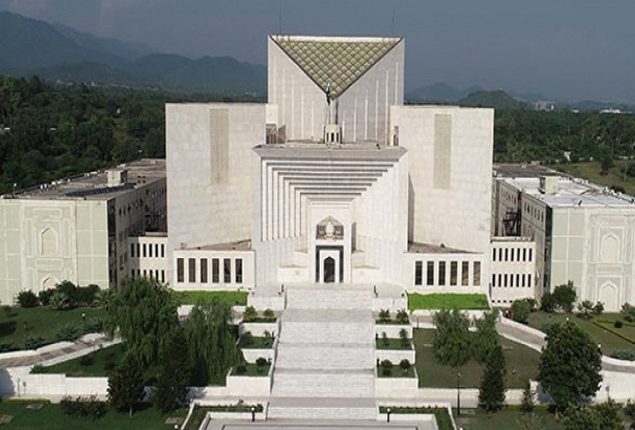
SC will hear case of civilians’ trial in military courts on Aug 1
ISLAMABAD: The Supreme Court has fixed the case of civilians’ trial in military courts for hearing on August 1.
A six-member bench headed by the Chief Justice of Pakistan will conduct the hearing, being held at 11:30 on August 1.
Justice Ejazul Ahsan, Justice Muneeb Akhtar and Justice Yahya Afridi included in the bench.
Justice Mazahir Naqvi and Justice Ayesha Malik are also part of the bench
The Supreme Court had given time to the Attorney General to take instructions on the right of appeal against the decisions of the military courts.
On July 22, the Attorney General for Pakistan (AGP) informed the Supreme Court of Pakistan that there will be no death sentence for the persons involved in May 9 riots. During the hearing, AGP Mansoor Usman Awan explained the procedure of trial conducted under the Army Act 1952. He informed that as per the investigation conducted so far, there is no case that entails death sentence and life imprisonment. Under Section 7 of the Official Secrets Act (OSA) there is only two-year sentence. He said that Section 3(a) of the OSA will not apply.
The Chief Justice remarked that you mean to say that there is no case of aggravated sentence. The attorney general explained that if there is a case of Section 3(a) then it will fall under Section 3(b). Justice Ayesha questioned the AGP how you can say at this stage that there is no case of death sentence, while the trial has not commenced yet.
Justice Afridi remarked that prima facie as far the inquiry conducted under Rule 13 of the Army Act there is no case of death sentence and even if the charges are of Section 3(a) then those would be treated as charges under 3(b) of the COSA.
The AGP also assured the bench that the reasons will be recorded of the military courts’ verdict and the accused persons will be allowed to engage private counsel of his choice. About the appeal against the military courts’ judgment, he said right of appeal against the final decision of the Court Martial was introduced in the Army Act through an amendment in 1992. The appeal within the army system is heard by an army officer to the rank of Major General.
He explained that after this procedure the accused can challenge the verdict of military court under Article 199 of the Constitution on three grounds (mala fide, coram non judice, and without jurisdiction) laid down in the Rawalpindi District Bar Association case. The persons then can approach against the high courts judgments under Article 185 of the Constitution.
He said that as far the appeal before the judicial forum or retired judge as happens in India is concerned more consideration is required, as there is case of Kulbushan Yadev tried under 2(1)(d) of Army Act and people held on espionage charges, and there is also the matter of international implication.
The AGP sought one month to consider the aspect of providing appeal before ordinary courts, as it may be done through legislation. The Chief Justice allowed the government to continue with the inquiry under Rule 13 of the AA, but directed not to hold trials of those persons arrested in light of May 9 incidents.
Read More News On
Catch all the Pakistan News, Breaking News Event and Latest News Updates on The BOL News
Download The BOL News App to get the Daily News Update & Follow us on Google News.




